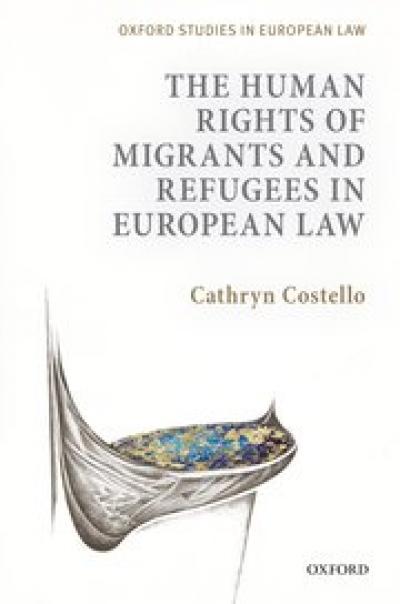Book Review: The Human Rights of Migrants and Refugees in European Law
Posted:
Time to read:
Guest post by Sarah Singer, Lecturer in Refugee Law at the Refugee Law Initiative, School of Advanced Study, University of London. Sarah is Programme Director of the MA in Refugee Protection and Forced Migration Studies (distance-learning) and Managing Editor of the International Community Law Review journal (Brill). She has published broadly on asylum and migration, particularly in the area of (suspected) criminality.
Review of The Human Rights of Migrants and Refugees in European Law, by Cathryn Costello (Oxford University Press, 2015)

The book is divided into eight chapters and an annex. In Chapter 1 Costello charts the evolution of the European legal landscape, highlighting the transformative potential of the EU’s Area of Freedom, Security and Justice, particularly in challenging the statist assumption often applied to migration control which presupposes rights enjoyed within bounded States. Such a conception, Costello argues, seems outdated in the age of human rights and increasing globalization, yet remains ‘stubbornly ingrained’ in the migration context (p.10). In Chapter 2, Costello develops the interpretive model advanced throughout the book – a pluralism in which mutual engagement and interaction across different human rights regimes is encouraged, though divergence is also embraced. As Costello explains, this ‘constructive human rights pluralism’ calls for engagement and mutual regard between the different European legal orders, but is also attuned to when each system should develop distinctive approaches (p.42). This lays the groundwork for the analysis which follows in the remainder of the book.
In Chapter 3 Costello examines the manner in which EU law constructs migration status and the notion of ‘illegal immigration’, illustrating how migration status permeates human rights claims by migrants in a variety of areas. The following chapters consider four substantive ‘flashpoints’ where EU law, in interaction with ECHR standards and other international norms, impact on entry and residence rights; namely, family migration (Chapter 4), refugeehood and non-refoulement (Chapter 5), access to protection (Chapter 6) and immigration detention (Chapter 7). Through each of these thematic areas Costello explores the standards of and interaction between EU legislative norms, EU human rights law, ECHR standards and (where relevant) other international norms, providing an easily-navigable narrative that furthermore charts divergences and convergences between these legal regimes. Chapter 8 brings together these threads of analysis and concludes with a thoughtful reflection on the role of the Luxembourg and Strasbourg courts in protecting the rights of migrants and refugees, in light of their distinct institutional settings. The Annex details State participation in EU asylum and immigration measures, and includes a comprehensive table of those in which the UK and Ireland do (and do not) participate.
This book is an invaluable resource for all scholars, practitioners and students of EU human rights, asylum and migration law. The incredibly detailed exposition of the thematic areas included therein provides an essential point of reference for teachers, students and researchers alike. Equally, Costello’s lens of constructive human rights pluralism, which permeates the analysis throughout, provides important insights on the role of the Strasbourg and Luxembourg courts in protecting the rights of migrants and refugees and, importantly, their limitations. The central contention of the book is that, ‘while the ECtHR provides important protections for the human rights of migrants, when issues of admission are at stake, that court is too deferential to the States’ migration control prerogatives’, and here EU law offers transformative potential (p.3). Given the institutional limitations of the Strasbourg court and the distinctive constitutional context of the EU, Costello advocates the transformative potential of the Court of Justice of the European Union and EU legal framework. Crucially, Costello stresses that critical engagement between the EU and ECHR legal orders is called for, rather than automatic integration. Indeed, she contends that the distinctive features of the EU warrant a different approach to human rights claims by migrants.
Recently awarded the Odysseus Network Best Publication Prize, this book is truly an outstanding contribution to the field of European migration and asylum law. As we witness increasing hostility towards migrants and refugees across Europe, and reflect on the role and form of EU asylum and migration measures, this book is important and timely in stressing the role of the EU in the protection of these groups of people. As Costello herself notes, ‘[t]he urgency of the task of realizing the human rights of migrants and refugees in European law is all too apparent’ (p.326), and her emphasis on the transformative potential of the EU legal framework in setting out clear rights for migrants and refugees, and constraints within which States must work in their border controls, is pertinent now more than ever.
Any comments about this post? Get in touch with us! Send us an email, or post a comment here or on Facebook. You can also tweet us.
__________
How to cite this blog post (Harvard style)
Singer, S. (2017) Book Review: The Human Rights of Migrants and Refugees in European Law. Available at: https://www.law.ox.ac.uk/research-subject-groups/centre-criminology/centreborder-criminologies/blog/2017/01/book-review-1 (Accessed [date]).
Share:








